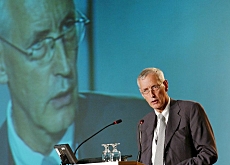Swiss look to free trade after WTO failure

Switzerland is looking to boost its free trade accords with other countries following the collapse of world trade talks, says the country's top economics official.
The head of the State Secretariat for Economic Affairs (Seco), Jean-Daniel Gerber, said in a newspaper interview on Sunday that the agreements would have to be considered the “second best solution”.
The Doha Round of world trade talks collapsed in July after the breakdown of negotiations in Geneva between the six leading members of the World Trade Organization.
Analysts said the last-ditch talks between the European Union, the United States, Japan, Brazil, Australia and India failed due to the intransigence of Washington and Brussels to give ground on agriculture.
Switzerland, which has a strong farmers lobby, has always rejected WTO calls to lower farm subsidies and import tariffs on agricultural products, but has pushed for liberalisation of services and lower tariffs for industry.
In an interview in the German-language SonntagsZeitung, Gerber said that the impasse at the WTO had prompted Seco to reconsider its foreign trade policy.
“Now we have to strive for the second best solution and that is free trade agreements,” he told the newspaper.
Seco has restarted negotiations with Canada on the issue and is hoping to conclude an accord by early next year, he said.
“From a Swiss point of view there is a controversial point – Canada wants to have concessions on agricultural subsidies,” said Gerber.
Earlier this year, hopes of serious negotiations on such a Swiss-US free trade accord were dashed over differences on agriculture.
Gerber added that Switzerland was also working with Thailand, Egypt and the members of the Gulf Corporation Council – United Arab Emirates, Bahrain, Kuwait, Oman and Qatar – to find free trade solutions. Japan is also on the agenda.
Domestic market
In terms of the internal market, Gerber said the government had already implemented several reforms to make the country more competitive.
This included the free movement of people accord with the European Union, anti-debt measures and the new law regulating the internal market and competition.
The strong growth experienced by the domestic economy – which Seco estimates will rise by 1.7% next year – follows the trend on the world markets, said the economist.
But he warned that Switzerland’s economy was still in need of reform, especially in the health and agriculture sectors. He was also concerned by the increasing national debt.
Seco is currently considering proposals on how to achieve stable and lasting economic growth, which also takes into account social and environmental factors, said Gerber.
But he was less forthcoming as to whether there would be a second package of reforms aimed at promoting growth.
“There could be a second reform package. But it is still to early for such a formulation,” said Gerber.
swissinfo with agencies

More
Seco
Free trade is an international trade system which is based on reducing the barriers to the free circulation of goods and services.
Switzerland has followed this policy for a while. In 1960 it joined the European Free Trade Association (Efta).
Most Efta countries have left to join the EU, but Switzerland has not become a member, preferring to conclude bilateral accords with the EU.
Efta (which also includes Liechtenstein, Norway and Iceland) has also concluded free trade agreements with non-European countries such as Singapore, Israel and Chile.
Recent Swiss negotiations with the US on free trade have however stalled.

In compliance with the JTI standards
More: SWI swissinfo.ch certified by the Journalism Trust Initiative











You can find an overview of ongoing debates with our journalists here . Please join us!
If you want to start a conversation about a topic raised in this article or want to report factual errors, email us at english@swissinfo.ch.